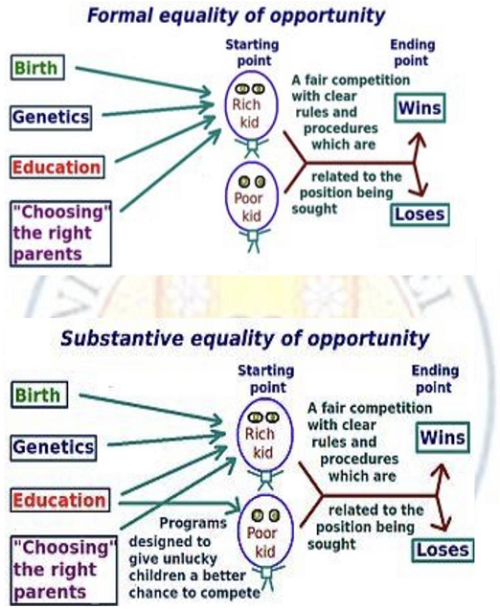Home »
MCQs »
BA Political Science MCQs
Political Theory: Concepts and Debates MCQs
Concepts and Debates is a progressive account of the practical nature of political theory, the way in which the political theory always intends to change the world while connecting with realities.
This section contains the multiple-choice questions and answers on Bachelor of Arts Political Science - Political Theory: Concepts and Debates. Practice these MCQs to learn and test the Political Theory: Concepts and Debates.
List of Political Theory: Concepts and Debates MCQs
1. Who wrote the book "Development as Freedom"?
- John mill
- Gerald MacCallum
- Amartya Sen
- None of the Above
Answer: C) Amartya Sen
Explanation:
In his book "Development as Freedom" (1999), the noted economist and philosopher Amartya Sen links freedom with development.
2. Who argues, "Equality of opportunity is the acceptable face of equality, commanding support across the political spectrum"?
- Amartya Sen
- Adam swift
- Charles Taylor
- All the above
Answer: B) Adam swift
Explanation:
Adam Swift argues "Equality of opportunity is the acceptable face of equality, commanding support across the political spectrum". The notion of equality of opportunity follows from the idea of formal equality and can be traced even in the writings of Plato who propose an educational system that offers all children equal chance to realize their talents and social positions based upon merit and efforts.

3. According to whom "An Act of toleration is an agent's intentional and principled refrain from interfering with an opposed other (or his behaviour etc.) in the situation of diversity where the agent believes he has the power to interfere"?
- Adam swift
- Amartya Sen
- Cohen
- Murphy
Answer: C) Cohen
Explanation:
According to Cohen "An act of toleration is an agent's intentional and principled refrain from interfering with an opposed other (or his behaviour etc.) in the situation of diversity where the agent believes he has the power to interfere.
4. Which of the following are the crucial conditions that enabled liberal multiculturalism to emerge in the Western World?
- Increasing Rights consciousness
- Consensus on Human rights
- Demographic Change
- All the above
Answer: D) All the above
Explanation:
Kymlicka has listed five crucial conditions that enabled liberal multiculturalism to emerge in the Western World:
- Increasing Rights consciousness
- Demographic Change
- Multiple access points for non-dominant groups to communicate their claims
- Desecuritization of ethnic relations
- Consensus on Human rights
5. "A belief in only one theory or value; it is implicitly totalitarian" is called?
- Naturalism
- Monism
- Culturalism
- Pluralism
Answer: B) Monism
Explanation:
Monism is a belief in only one theory or value; it is implicitly totalitarian.
6. "Puts forth the view that human beings are socially and culturally constructed varying from culture to culture" defines?
- Self-government rights
- Naturalism
- Culturalism
- None of the above
Answer: C) Culturalism
Explanation:
Culturalism puts forth the view that human beings are socially and culturally constructed varying from culture to culture.
7. "A belief in the supreme importance of an individual rather than of any social group or collective body"is known as ?
- Self-government rights
- Naturalism
- Culturalism
- None of the above
Answer: A) Individualism
Explanation:
Individualism a belief in the supreme importance of individual rather than of any social group or collective body
8. "A tendency or an attitude to falsely project the norms of the dominant group as standard and universal and impose them on other groups which are considered as 'deviants'." Is it known as?
- Discrimination
- Cultural Plurality
- Monism
- None of the above
Answer: D) None of the above
Explanation:
Assimilationist a tendency or an attitude to falsely project the norms of the dominant group as standard and universal and impose them on other groups which are considered as 'deviants'.
9. The term democracy has its roots from?
- Greek word demokratia
- German word demokratia
- French word demokratia
- None of the above
Answer: A) Greek word demokratia
Explanation:
The term democracy has its roots in the ancient Greek word 'demokratia'.
In this word 'demos' means 'people' and 'kratia' means "rule or power" . If we combine these two combinations the literal meaning of the word "democracy" comes out to be "rule by the people".
10. When was Poorna Swaraj first declared?
- January 5,1930
- January 1, 1930
- January 20, 1931
- January 26, 1930
Answer: D) January 26, 1930
Explanation:
The Purna Swaraj resolution proclaimed on January 26, 1930.
Advertisement
Advertisement